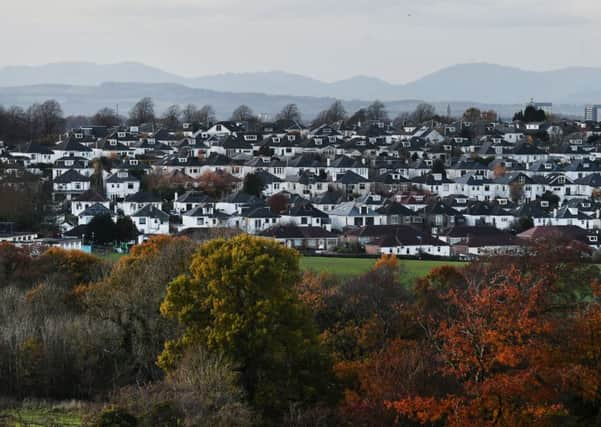East Renfrewshire: Brexit threatens to change election dynamic of bellwether seat


This is the prosperous suburban constituency of East Renfrewshire on Glasgow’s southwestern edge. When people move to Giffnock, they don’t tend to leave – because of its good schools, decent transport links and better-than-average housing.
People are happy to stop and chat this Friday lunch time – but their smiles quickly fade when the topic of conversation is moved to next month’s general election. “I’m exhausted with politics,” sighs Joan, one of the town’s many retirees. It’s a response shared by many.
Advertisement
Hide AdAdvertisement
Hide AdWhether they like it or not, voters will troop to the polls on 12 December for a third general election in less than five years. For all its appearance of continuity, East Ren – as the locals like to call it – has elected three different MPs from three different parties since 2010.
The seat is currently held by Paul Masterton of the Conservatives with a majority of 4,712 – a solid return given how close other results were at the last UK poll in 2017.
It may not be top of their list of targets, but this constituency remains one the SNP would dearly love to win. That’s partly because election results here have a habit of mirroring seismic moments in recent political history. When suburban voters decide it’s time for a change, it means something big must be happening.
East Ren, centred on Giffnock and the neighbouring towns of Clarkston and Barrhead, was once considered the safest Conservative seat in Scotland. But that didn’t stop Jim Murphy claiming it in 1997 as the New Labour landslide swept the country.
Murphy seemed a good fit for East Ren. A centrist cabinet minister and firm supporter of the Union, he easily retained the seat at three subsequent elections in 2001, 2005 and 2010.
But even his relatively high profile couldn’t save him at the 2015 poll when a yellow tidal wave dramatically reshaped the Scottish electoral map. Only a year before, a solid 63.2 per cent of East Ren voters had rejected independence. Kirsten Oswald took advantage of a Unionist vote split between Labour and the Tories to win the seat for the SNP.
Two years later and Theresa May’s fateful snap election saw the Conservatives win it back
So are we looking at another three-way scrap this time around? Masterton doesn’t think so.
Advertisement
Hide AdAdvertisement
Hide Ad“The 2017 result spoke for itself,” he told Scotland on Sunday. “This is not a three-way marginal. It’s a straight SNP-Conservative fight.
“My eyes are trained on people who back Scotland’s place in the Union. I want them to understand if they want to beat the SNP, they have to vote Conservative.
“It’s clear that Jeremy Corbyn will grant Nicola Sturgeon her second independence referendum. For us, it’s about having conversations with local Labour Unionist voters and talking them through the realities of the seat. If they want to keep Scotland in the Union, they have to lend me their vote.
“If the SNP win seats like East Renfrewshire back, they’re going to move forward with their plans for another independence referendum.”
But indyref2 is, of course, not the only constitutional conundrum on voters’ minds. There’s also the small matter of Brexit. On this, East Ren has made its opinion clear – a thumping 74 per cent of voters backed Remain in 2016.
Masterton, 34, was a Remainer but eventually voted for Boris Johnson’s revised Brexit deal. “People are frustrated that parliament has not got this sorted,” he said. “They are not thrilled about a December election, but they understand why we need to have one.
“I think most people come at Brexit from the same angle as me – I was a big Remainer, but we had that argument, and at a UK-wide level, unfortunately, we lost it. So we have to get on, deliver it, and move the country forward.”
It’s this acceptance of Brexit that the SNP views as an opportunity. Nationalist Oswald will fight to hold on to her seat. Despite only joining the party in 2014, this will be her third general election campaign.
Advertisement
Hide AdAdvertisement
Hide Ad“It’s nice when you knock on people’s doors and they instantly recognise you,” she said. “But I think what really matters to people is whether you are going to roll up your sleeves and work hard for the area.”
Oswald points to the turnouts at elections in East Ren – at the 2014 referendum it hit 90 per cent – as proof of how politically engaged locals are. “I’m not meeting anyone who thinks what is happening at Westminster with Brexit is positive,” she said. “People are really scunnered by it. We have a strong position on Europe and voters realise that.”
Asked if the area’s rejection of independence in 2014 meant she had to play down independence on the doorstep, Oswald said: “I think people realise Scotland needs to have a choice. I’m clear what I stand for and people understand the position of the SNP.
“Whatever happens with Brexit, whether its Boris Johnson’s deal or otherwise, it’s not going to help people in East Renfrewshire.
“There are lots of EU nationals who live and work in our constituency. The idea of stopping Boris and his Brexit plan resonates here.”
Back on Fenwick Road, at least one voter agreed. Charlie Shaw – a self-confessed SNP activist – described Brexit as the “most important issue” of the election. But he added the “exhaustion” among voters could see turnout fall.
Further up the street, Christine and partner Billy described themselves as undecided voters. “We could just end up with the same mess all over again with another hung parliament,” said Billy.
Christine added: “I just really can’t face another election.”